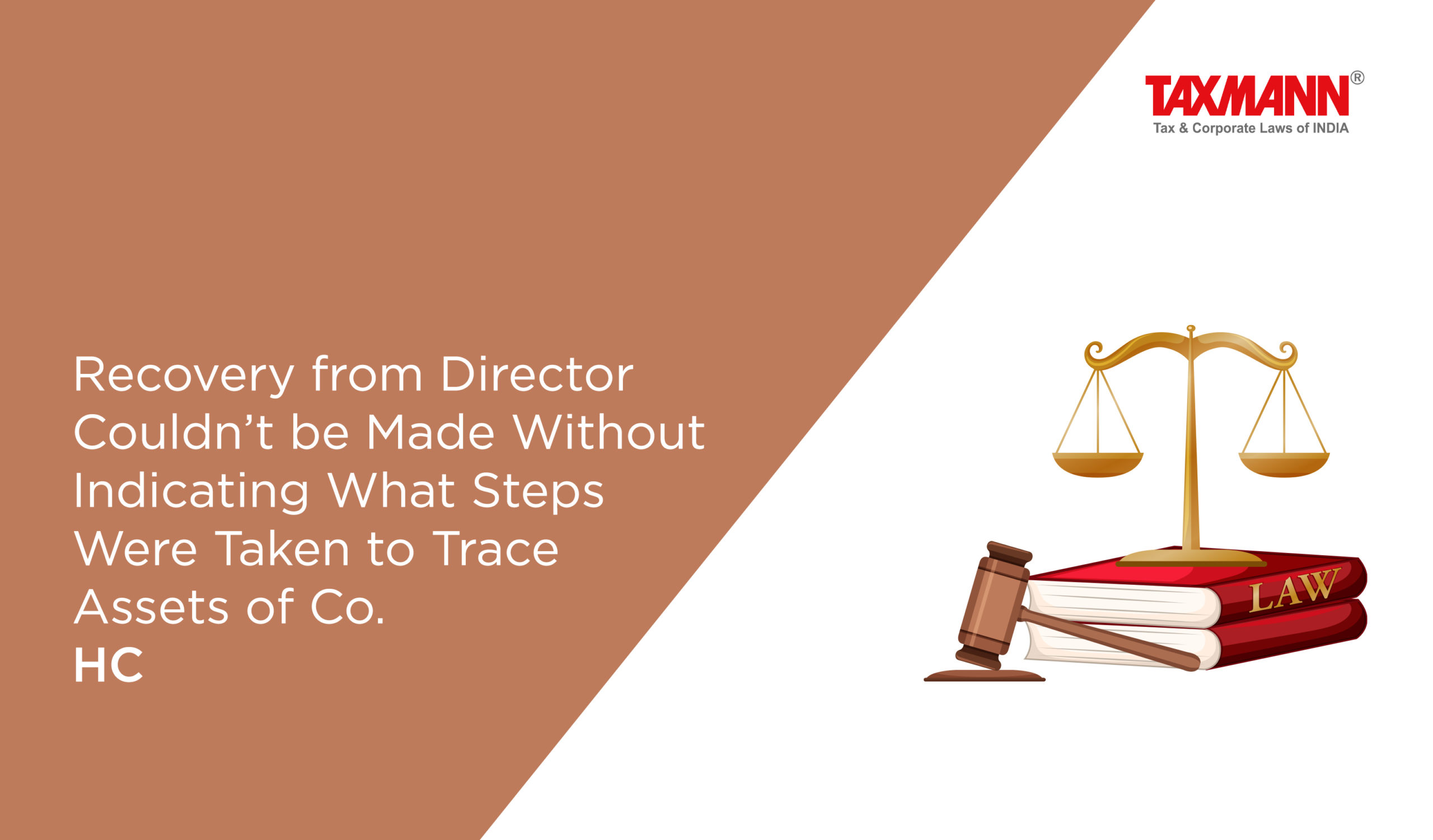Recovery from Director Couldn’t be Made Without Indicating What Steps Were Taken to Trace Assets of Co. | HC
- Blog|News|Income Tax|
- 2 Min Read
- By Taxmann
- |
- Last Updated on 12 September, 2023

Case Details: Manjula D. Rita v. Principal Commissioner of Income-tax - [2023] 153 taxmann.com 468 (Bombay)
Judiciary and Counsel Details
-
- K.R. Shriram & Firdosh P. Pooniwalla, JJ.
- Ranit Basu, Ms Maitri Malde & Ms Nikita Ghungarde for the Petitioner.
- Suresh Kumar for the Respondent.
Facts of the Case
The deceased assessee was a director of a company. An assessment order was passed, making several additions to company income and tax demand. The stay application filed by the company was rejected. Thereafter, an order under section 179 was passed upon the assessee raising tax demand from him.
The assessee filed a revision petition against said order passed under section 179, which was rejected. Assessee writ petition before the Bombay High Court.
High Court Held
The Bombay High Court held that there was no evidence to indicate even any notice was issued to the deceased. The affidavit stated that only letters were issued through speed post, and the same were not returned undelivered. Thus, the Assessing Officer (AO) attempted to find out the whereabouts of the assessee.
There was no evidence annexed to show that even such a letter was prepared or the letter was sent by speed post, or a query was sent to the Post Master to find out the status of the delivery of the said letter. In the circumstances, the Court will have to proceed because no letter or notice was sent to the deceased before the order under section 179 came to be passed.
There is also nothing to indicate what steps were taken to trace the company’s assets. Moreover, the order passed under section 179 does not satisfy any of the ingredients required to be met. Further, the deceased has not even been allowed to establish that the non-recovery cannot be attributable to any of the three factors on his part, i.e., gross neglect, misfeasance or breach of duty. The gross negligence, etc., is to be viewed in the context of non-recovery of tax dues of the company and not with respect to the general functioning of the company.
Once the director, after being given an opportunity, places material on record to establish that non-recovery cannot be attributed to gross negligence, misfeasance or breach of duty, the Tax Recovery Officer must apply his mind and come to definite findings. Therefore, considering the facts of the case, the order passed for commencing proceedings under section 179 upon the assessee was to be quashed and set aside.
List of Cases Reviewed
-
- Prakash B. Kamat v. Pr. CIT [2023] 151 taxmann.com 344 (Bom.) (para 9)
- Maganbhai Hansrajbhai Patel v. Asstt. CIT [2012] 26 taxmann.com 226/211 Taxman 386/[2013] 353 ITR 567 (Guj.) (para 10) followed.
List of Cases Referred to
-
- Prakash B. Kamat v. Pr. CIT [2023] 151 taxmann.com 344 (Bom.) (para 9)
- Maganbhai Hansrajbhai Patel v. Asstt. CIT [2012] 26 taxmann.com 226/211 Taxman 386/[2013] 353 ITR 567 (Guj.) (para 10).
Disclaimer: The content/information published on the website is only for general information of the user and shall not be construed as legal advice. While the Taxmann has exercised reasonable efforts to ensure the veracity of information/content published, Taxmann shall be under no liability in any manner whatsoever for incorrect information, if any.

Taxmann Publications has a dedicated in-house Research & Editorial Team. This team consists of a team of Chartered Accountants, Company Secretaries, and Lawyers. This team works under the guidance and supervision of editor-in-chief Mr Rakesh Bhargava.
The Research and Editorial Team is responsible for developing reliable and accurate content for the readers. The team follows the six-sigma approach to achieve the benchmark of zero error in its publications and research platforms. The team ensures that the following publication guidelines are thoroughly followed while developing the content:
- The statutory material is obtained only from the authorized and reliable sources
- All the latest developments in the judicial and legislative fields are covered
- Prepare the analytical write-ups on current, controversial, and important issues to help the readers to understand the concept and its implications
- Every content published by Taxmann is complete, accurate and lucid
- All evidence-based statements are supported with proper reference to Section, Circular No., Notification No. or citations
- The golden rules of grammar, style and consistency are thoroughly followed
- Font and size that’s easy to read and remain consistent across all imprint and digital publications are applied



 CA | CS | CMA
CA | CS | CMA
